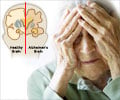Alzheimer's disease can be detected by reading its first signs in the eyes.
- Eyes can provide a valuable insight into the early detection of Alzheimer's disease
- By examining the optic nerve and retina, researchers can directly observe the nervous system and potentially detect the first signs of the disease before symptoms of memory loss appear
- Detecting the disease in its early stages can help patients make lifestyle changes and address modifiable risk factors
According to the paper, if doctors can detect Alzheimer's disease in its early stages, patients will be able to make good lifestyle choices and address modifiable risk factors such as high blood pressure, high cholesterol, and diabetes.
Eye is the Doorway to the Brain
Alzheimer's disease pathologies were detected in the accessible neurosensory retina, according to the study, which was published in the journal Acta Neuropathologica in February. "Yet, their exact nature and topographical distribution, particularly in the early stages of functional impairment, and how they link to disease progression in the brain," it stated.The researchers also discovered that female patients had higher levels of retinal microgliosis than males. A proteomic study of Alzheimer's retinas indicated that particular inflammatory and neurodegenerative processes were activated, while oxidative phosphorylation/mitochondrial and photoreceptor-related pathways were inhibited.
Retina is the Cue to Reading Signs of Alzheimer’s Disease
Author Maya Koronyo-Hamaoui, a professor of neurosurgery and biomedical sciences at Cedars-Sinai Medical Center in Los Angeles, said in a statement that the study is the first to provide an in-depth analysis of the protein profiles and molecular, cellular, and structural effects of the disease in the human retina, as well as how they correspond with changes in the brain and cognitive function."These changes in the retina correlated with changes in parts of the brain called the entorhinal and temporal cortices, a hub for memory, navigation, and the perception of time," Koronyo-Hamaoui added.














